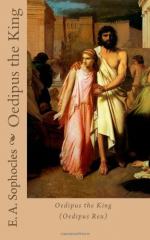|
This section contains 11,442 words (approx. 39 pages at 300 words per page) |

|
SOURCE: “Time and Knowledge in the Tragedy of Oedipus,” in Sophocles's Tragic World: Divinity, Nature, Society, Harvard University Press, 1995, pp. 138-60.
In the following excerpt, Segal discusses how indefinite descriptions of time in Oedipus Tyrannus are part of what obscures the identity of Laius's killer.
The story of Oedipus is the archetypal myth of personal identity in Western culture. It is the myth par excellence of self-knowledge, of human power and human weakness, of the determining forces of the accidents of birth that we can neither change nor escape. Its concerns are the interplay of supreme rationality and supreme ignorance, control and aggression in the human personality, and the relation of individual existence to order or chaos, meaning or meaninglessness in the world as we experience it and interpret it. Oedipus is a kind of black fairy tale; but, as Vladimir Nabokov remarks a propos of another fiction...
|
This section contains 11,442 words (approx. 39 pages at 300 words per page) |

|


